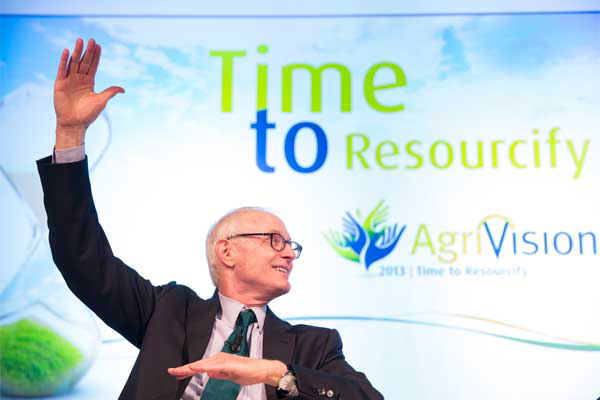Creating Shared Value for agribusiness

Creating shared value is the new way for companies, organisations and entrepreneurs worldwide to achieve economic success. This was professor Michael Porter’s message, of the Harvard Business School, during recent AgriVision (18-20 June), organised by Nutreco in Noordwijk aan Zee.
Today most organisations speak of sustainability and social responsibility. They are viewed as an essential part of a business’s focus, and without showing a willingness to do something for the environment and society, an organisation’s image is not strong.
However, Porter stresses that an active involvement is much stronger than just a willingness. Companies should and can trace back their success with the impact they have made on society. They should look at it as a great opportunity, not a challenge or problem. Especially when we are in the agribusiness, as food production essentially helps with feeding the growing population, and the industry as a whole is to be one of the key solutions for the decades ahead.
All businesses are engaged in society one way or another. But making profits and harmonising with society and the environment used to be, and in some cases still is, perceived as contradictory. Take for example, soil and water pollution as a consequence of applying chemical fertilisation, pesticides or irrigation. Such activities can be seen as ‘bad’ action, which may lead to anxiety in the local inhabitants and/or environmental protests.
Porter was nevertheless clear in making his point: Don’t react defensively. There is a vast range of opportunities for companies and organisations to choose from. By linking your company strategy to society’s needs success is achievable, this was his main message to the audience.
Competition
The challenge of every business is how to compete and win successfully. Being the best in the market is the aim of every organisation, but there is not only one way to compete. It’s the other way around. There are many ways, focuses and priorities to be taken into account through the value chain of a company’s operations, in which value addition is realised, and this can ultimately create a higher value than a similar product or service by a competitor. In other words, completing in the market in the same way as a peer is not good enough, it is merely creating a same value assuming all the conditions are equal.
Even in commodity businesses where products are more or less the same, the value chain can be totally different. It can be attained by realising operational excellence through a value chain such as sales, logistics, operation and service. Another option, equally effective, is to be cost efficient. It can be widely applied in grain trading, feed sales and livestock product supply to consumers.
Once again, there are so many options to choose from, and it is up to a company to take the best option which distinguishes them from competitors. Creating a strategy that focuses on their strengths and makes them unique in the market. Some customers will be lost but no company can serve every need of every customer, stresses Porter, and it is the choice a company makes, which as a result can create an added value. If a company is not successful, it is probably because it was not the best choice.
Integrating strategy and society as a business model
When creating a value, it is much more powerful to create a shared value with the communities in which it operates, rather than just within a company. Some people tend to place resources, environment and sustainability apart from the company strategy, or at least on the side-line but not the core. That is in part, as Porter explains, because economists have legitimised the idea that to provide societal benefits, companies must temper their economic success. In neoclassical thinking, a requirement for social improvement — such as safety or hiring the disabled — imposes a constraint on the corporation. Adding a constraint to a company that is already maximising profits will inevitably raise costs and reduce those profits, theoretically speaking.
This perspective has also been applied in defining company strategies, which have largely excluded social and environmental considerations from their economic thinking. Companies have taken the broader context in which they do business as a given and resisted regulatory standards as contrary to their interests. This often results in relying on governments and NGOs when it is necessary to tackle social and environmental problems. Corporate responsibility programmes have emerged largely to improve reputations as a reaction to or anticipation of external pressure, and are treated as a necessary expense.
From CSR to CSV
When creating shared value (CSV) based on corporate social responsibility (CSR), a company first has to determine the role of business in society, which needs continuous revision. The company then create philanthropy programmes or action plans to volunteer in the society or make donations to support worthy social activities. All those actions can form a basis for CSR, in order to show compliance with community standards, good corporate citizenship and sustainable business operations which can mitigate risks and harms. When the company is successful in achieving CSR, it in fact is already achieving CSV, at least partly. Integrating the challenge which the society is facing into engagement by the business is already a big step, and when that actually creates economic value, it is a great success that the company can be proud of.
Centre of strategy in the decades ahead
The CSV may be needed as a central unique strategy in the decades ahead, Porter believes. Capitalism has been the most powerful tool, and it is an unparalleled vehicle for meeting human needs, improving efficiency, creating jobs, and building wealth. And we are now facing a new era where capitalism may be taken over by a new concept; society’s needs are large and growing, while customers, employees, and a young generation are asking businesses to step up.
The most interesting strategy today is to integrate social aspects into core business. By shifting from a traditional positioning to a new positioning, many companies have been successful creating shared values. Look at Nestlé, it used to be a food & beverage company, and now it has repositioned as a nutrition company to support healthy living to humans. Look at Danone, it has refocused on dairy and water by selling off non-core businesses and acquiring medical nutrition and baby foods.
Likewise, there is a lot agricultural companies can do to solve a huge challenge of growing food demand in the decades ahead. Small fragmented farmer structure which is still the case in many countries will one day see technological and innovative CSV, which will lead to higher productivity and efficiency in rural areas. Society and economy will develop in those areas in the future, helping small-scale farmers. This will then create new operational models to preserve the society, for farmers to become more wealthy and well positioned to set their own strategies, and grow together as industry. There are incredible opportunities in agribusiness.
Biography
Professor Michael E. Porter is a leading authority on company strategy, the competitiveness of nations and regions, and strategic approaches to societal problems. Porter is generally recognised as the father of the modern strategy field, and his ideas are taught in virtually every business school in the world. Porter received a Bachelor of Engineering with high honours in aerospace and mechanical engineering from Princeton University, where he was elected to Phi Beta Kappa and Tau Beta Pi. He received an Master of Business Administration with high distinction from the Harvard Business School.











